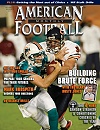Article CategoriesAFM Magazine
|
A Blueprint for Upcoming Seniorsby: David Purdum© More from this issue How two-time Illinois State Champion Ron Muhitch spent 22 years as a defensive coordinator preparing to be a head football coach. When he finally got his chance, he had a problem. “I didn’t know my players,” admits Muhitch, who now is headed into his tenth season as head coach at Wheaton-Warrenville South High School (IL). “I knew half of them, because I coached that half. But when I went to the offensive side, I realized that as a head coach I needed to know a little bit more about what my kids were looking for and who they were.” Muhitch went to work, sacrificing personal and Xs and Os time in his first season in exchange for learning about his student-athletes and their parents. T....The full article can only be seen by subscribers.
|
|
|||||||
| HOME |
MAGAZINE |
SUBSCRIBE | ONLINE COLUMNISTS | COACHING VIDEOS |
Copyright 2026, AmericanFootballMonthly.com
All Rights Reserved





